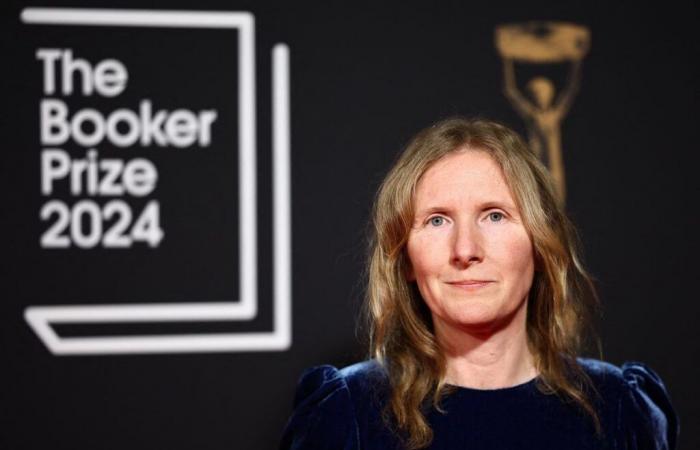Literature –
British Samantha Harvey winner of the 2024 Booker Prize
The British Samantha Harvey won the prestigious Booker Prize this year with her fifth novel, “Orbital”.
Posted today at 11:46 p.m.
Samantha Harvey, in London during the Booker Prize 2024 ceremony, Tuesday November 12, 2024.
AFP
Subscribe now and enjoy the audio playback feature.
BotTalk
The Booker Prize, a prestigious literary prize which rewards works of fiction in English, was awarded on Tuesday to the British Samantha Harvey for her fifth novel “Orbital”, after a predominantly female competition.
At the end of a ceremony organized in London, she won against four women and one man and succeeded the Irish writer Paul Lynch.
Human place in the universe
Imbued with lyricism, “Orbital” tells the story of a day in the life of six astronauts, two men and four women, aboard a space station. Constructed in almost meditative fragments, this novel offers a reflection on mourning, desire and the climate crisis. The subject of the book is not so much the discovery of space, but more the place of humans in the universe.
“Orbital” follows in the tradition of previous texts by Samantha Harvey, a 49-year-old novelist, which are intended to be explorations of the human psyche. Like his book on memory loss (“The Lost Memory”, Stock) or on his insomnia (“The Shapeless Unease”, untranslated). This work was published in March 2024 in French by Flammarion. It was very well received by international critics.
Launched in 1969, the Booker Prize rewards the author of the “best novel written in English” each year. Compared to the French Goncourt, it has contributed to the success of writers like Salman Rushdie, Margaret Atwood and even 2024 Nobel Prize winner Han Kang, who won it in 2016 with “The Vegetarian”. The prize is a reward of 50,000 Books (around 55,000 francs) and the promise of international fame synonymous with success in bookstores.
Beat the odds
Samantha Harvey defied the odds which favored Americans Rachel Kushner and Percival Everett. The latter, a multi-award winner, was the big favorite in this competition with “James”.
A bit like Kamel Daoud, 2024 Goncourt Prize winner who published in 2013 with “Meursault, contre-investigation” a counterpoint to Albert Camus’ classic, “The Stranger”, James Everett revisits one of the masterpieces of American literature: “The Adventures of Huckleberry Finn” (1884) by Mark Twain. This time, the narration is from the point of view of Jim, a slave.
One of the main plot threads is linguistic. In Twain, Jim’s dialect makes him a limited, somewhat pathetic character. In Everett, it is thought of as a survival tool that slaves use to hide their real abilities from white slavers.
Disappointed finalists
Like his compatriot Rachel Kushner with “Creation Lake” (Prix Médicis 2018 with “Le Mars Club”), he escaped the famous prize for the second time. The Canadian Anne Michaels, dubbed by her compatriot Margaret Atwood, also leaves empty-handed despite very good reviews from the press with “Held”.
In this new novel, the novelist explores the themes of her previous stories: history, memory, the effects of trauma and mourning over long periods, through the story of a man who tries to overcome the wound of the Great War.
Disappointment also for the Australian Charlotte Wood who failed to win with “Stone Yard Devotional”. In this seventh book, the author tells the story of an anonymous woman who, after leaving her job as a conservationist and her husband, retreats to an isolated community of nuns near the town where she grew up. She was the first Australian to reach the final of the award in ten years.
Finally, the youngest in the competition, the Dutch Yael van der Wouden, did not manage to create a surprise with her historical fresco “The Safekeep”, her highly acclaimed first novel.
“The Tribune of Books”
The “Tribune de Genève” offers you shared readings, reviews, book news, reports and your favorites.
Other newsletters
Log in
AFP
Did you find an error? Please report it to us.
0 comments






